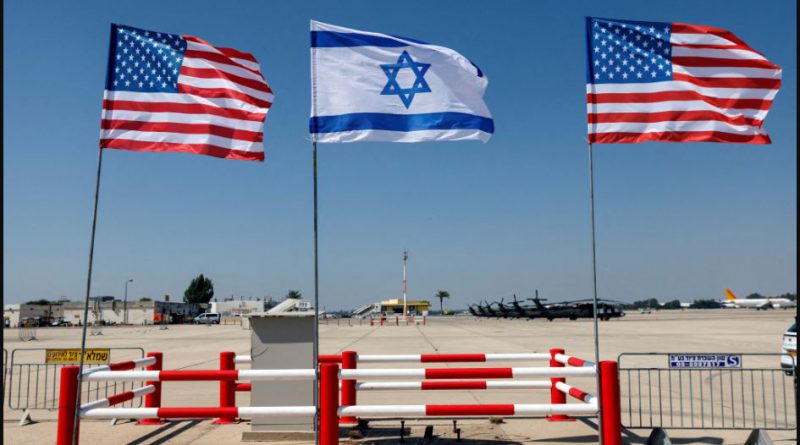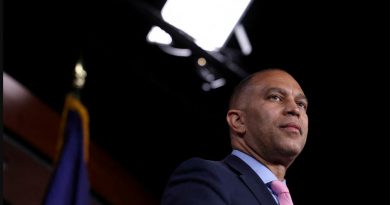Exclusive: U.S. quietly inspects Israeli crossings for its Palestinian dual-nationals
Jerusalem (Reuters) – U.S. observers are in Israel this week to discreetly assess conditions at its border crossings for Palestinian-Americans as part of an emerging Israeli-U.S. visa waiver deal, four officials said.
The officials, who declined to be identified by name or nationality, said the delegation visited Israel’s immigration office on Sunday, Ben Gurion Airport on Monday and would on Tuesday tour checkpoints on the occupied West Bank’s boundaries.
In return for visa-free access for Israelis, Washington has demanded that Israel provide reciprocal unfettered passage for Americans, regardless of their background.
That would overhaul travel rules for tens of thousands of Palestinian-Americans who live in the West Bank, as well as, potentially, those from the United States, some of whom complain about harassment or travel bans when trying to visit relatives.
In a six-week trial period launched on July 20, Israel must show it is admitting Americans without differential treatment as a condition for its admission to the U.S. Visa Waiver Program (VWP). The deadline for a decision on the deal, which would enable visa-free U.S. travel for Israelis, is Sept 30.
Since the trial period began, Palestinian Americans already say there is a difference. Abdul Jalil Juda, 26, said he was able to come home to the West Bank through Ben Gurion, rather than flying to Jordan and making the journey over land as previously required.
“It was smooth. When they (airport security) find out you are Palestinian, they search thoroughly, but the procedures are smooth. This is the first time for me after the decision. It is easier for us,” he told Reuters. “You can be home in half an hour.”
The U.S. Embassy in Jerusalem and Israel’s National Security Council, which is heading up the trial period, declined to comment on the visiting U.S. delegation – including to confirm its presence.
The allies have sought to limit publicity around the trial period, which comes amid unusually intense strains between their leaderships over wider Palestinian policies and other issues.
For Israeli Prime Minister Benjamin Netanyahu, clinching the VWP may offer domestic reprieve from a major constitutional crisis over his plans to overhaul the judiciary.
One official told Reuters the trial period has been “going smoothly,” without significant hold-ups for Palestinian American travellers. A second official supported this characterisation.
The numbers are still small. Asked how many Palestinian-Americans have travelled into or through Israel during the trial, the officials gave assessments ranging from “high two-figures so far” to “between 100 and 200”.
Oppotunity
A man describing himself as the first Palestinian American to enter Israel in the early hours of July 20 said in a video posted from Ben Gurion that his admission took mere minutes: “I entered using the U.S. passport only. They (immigration staff) did not ask me anything regarding a Palestinian passport.”
Nerdeen Kiswani, a Palestinian-American law student at City University of New York who has called for anti-Israel boycotts, posted Facebook pictures of herself in Israel this week after crossing from Jordan to the West Bank at an Israeli terminal.
She said she had been refused entry there in 2015.
“I decided to use the opportunity of this visa waiver program to see my family after being denied that right for almost a decade,” she told Reuters by email.
“It was not entirely smooth sailing, however, as I was made to wait nearly four hours and I reached out to the U.S. Embassy before being allowed in,” she said. Most of her family “received their visas and passports back almost immediately,” she added.
Two of the officials who spoke to Reuters said that the visiting U.S. delegation, made up of Department of Homeland Security and State Department representatives, was expected to wrap up the visit this week and file reports in Washington.
The U.S. Embassy would continue monitoring the trial, they said, including by compiling any complaints received through an online form and emergency phone numbers posted on its website.
The Arab American Institute Foundation puts the number of Americans of Palestinian descent at between 122,500 and 220,000. A U.S. official estimated that, of that number, between 45,000 and 60,000 were residents of the West Bank.
An Israeli official gave lower figures, saying that out of 70,000 to 90,000 Palestinian Americans worldwide, about 15,000 to 20,000 were West Bank residents.
The trial period does not apply to hundreds of Palestinian-Americans in the Gaza Strip, which is governed by Hamas Islamists designated terrorists by Israel and the United States.



